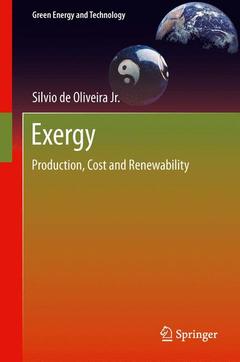Description
Exergy, 2013
Production, Cost and Renewability
Green Energy and Technology Series
Author: de Oliveira Junior Silvio
Language: English
Subjects for Exergy:
Approximative price 168.79 €
In Print (Delivery period: 15 days).
Add to cartPublication date: 12-2014
338 p. · 15.5x23.5 cm · Paperback
Approximative price 168.79 €
In Print (Delivery period: 15 days).
Add to cartPublication date: 11-2012
338 p. · 15.5x23.5 cm · Hardback
Description
/li>Contents
/li>Biography
/li>Comment
/li>
Bridging the gap between concepts derived from Second Law of Thermodynamics and their application to Engineering practice, the property exergy and the exergy balance can be a tool for analyzing and improving the performance of energy conversion processes. With the exergy analysis it is possible to evaluate the performance of energy conversion processes not only on a thermodynamics basis but also by including production costs and environmental aspects and impacts of the studied processes. This comprehensive approach of the use of energy has, as one of the most important feature, the identification of sustainable ways of energy resources utilization.
Based on the fundamentals of the exergy concept, its calculation, graphical representations and exergy balances evaluation, Exergy: Production Cost And Renewability describes the application of detailed exergy and thermoeconomic analysis to power plants and polygeneration systems, petroleum production and refining plants (including hydrogen production), chemical plants, biofuel production routes, combined production of ethanol and electricity, aircraft systems design, environmental impact mitigation processes and human body behavior.
The presented case studies aim at providing students, researchers and engineers with guidelines to the utilization of the exergy and thermoeconomic analysis to model, simulate and optimize real processes and industrial plants.
1. Introduction.- 2. Exergy: exergy costing and renewability analysis of energy conversion processes.- 3. Exergy and thermoeconomic analysis of power plants, refrigeration and polygeneration systems.- 4. Exergy evaluation of petroleum production and refining processes.- 5. chemical processes analysis and improvement.- 6. Exergy analysis and parametric improvement of the combined production of sugar, ethanol and electricity.- 7. Exergy and renewability analysis of liquid biofuels production routes.- 8. Exergy method for conception and assessment of aircraft systems .- 9. Exergy analysis and environmental impact.- 10. Exergy analysis and human body behavior.
Silvio de Oliveira Júnior is an Associate Professor at Polytechnic School of the University of São Paulo, Brazil. He has been developing research activities on heat pumps and refrigeration systems, solar energy, energy conservation in industrial processes, cogeneration systems and exergy and thermoeconomic analysis of thermal processes. He has supervised seven Doctor Thesis (in Mechanical Engineering), 16 Master Dissertations (in Mechanical Engineering, Automotive Engineering and Energy), 9 MBA in Energy and Cogeneration and Distributed Generation, and 69 Undergraduate Projects in Mechanical Engineering. He is author/co-author of about 190 publications and communications and senior member of the Brazilian Society of Mechanical Sciences and Engineering. He is also member of the Editorial Board of the International Journal of Thermodynamics. He has been involved in the past ten years with research projects related to energy utilization in biodiesel production plants, sugar and alcohol utilities and production plants, offshore and onshore petroleum platforms, refinery utilities plants, production processes of petroleum derived fuels, co/trigeneration and combined cycle plants, airplane energy systems and modeling and simulation of twin-screw multiphase pumping systems.




